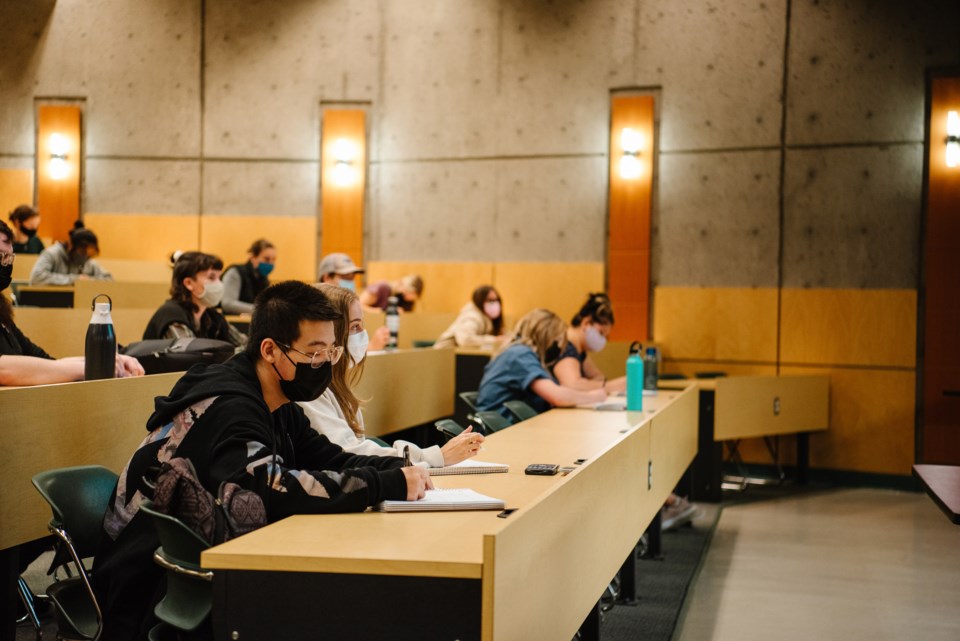After a one-week online sojourn away from in-person learning to the start of the winter semester, students at the University of Northern B.C. will be back on campus for classes, as they were in the fall term.
As of Monday, close to 70 per cent of classes will be taught with students gathered with their instructors as the post-secondary world continues to deal with a pandemic spike in the number of infections related to the Omicron variant.
Despite skyrocketing rates in all B.C. health regions, transmission rates have been low across the province in postsecondary schools and provincial health officer Dr. Bonnie Henry considers them low-risk environments. So far, according to UNBC president Geoff Payne, Henry’s assessment of the risk factor had held true at UNBC.
“From a UNBC perspective, we ran the fall term at 70 per cent face-to-face, although we didn’t have Omicron during that period, and we had no outbreaks of COVID on our campus,” said Payne, who offered several reasons why the virus has so far been held in check.
“Post-secondaries are highly-vaccinated group, I can’t give you the numbers of us but I’m pretty sure we’re high,” he said. “They’re very structured activities in terms of classrooms and everybody has been following the guidelines in terms of mask-wearing and all those health protocols, and that’s why Dr. Henry feels that post-secondaries are on the low end of transmission rates.
“Do we have COVID on our campus, absolutely. But because of the vaccine status, what you don’t get is outbreaks, and that’s what we saw in the fall term.”
UNBC currently has 3,089 students enrolled in winter semester programs. For each UNBC course, the first class of the new term was online, which Payne says gave every student a common starting point. The university announced last week it was planning a return to in-class learning as of Monday and Payne says they will stick to that plan.
“With the fall term, we were about 70 per cent face-to-face (classes) and we made the decision as we were going into winter 2022, before Omicron hit, that we wanted to keep around a similar level of face-to-face, versus online,” said Payne.
“We were scheduled to start our normal winter 2022 term on January 4th, which was already approved, and when Omicron sort of hit, we made a decision, as a lot of institutions across the country did, to hit pause and just wait and see and put some things on the online space to start.”
Payne said labs are going ahead as usual, with students working in close proximity with their colleagues while sticking to provincial health restrictions.
“We had already said labs are starting right away, because they are very small and we were able to manage that,” said Payne. “Everything that we outlined had already been pre-planned for face-to-face starts on the 17th.
“I remember March 11, 2020, when I sent out my first (COVID) communication and I said this seems to be in the Lower Mainland, don’t worry. The fact we are here on January 14, 2022, I’m amazed. But it’s still out there and we’ve got to remain vigilant in terms of following the guidelines.”
Like UNBC, the College of New Caledonia postponed the start of the new term by a week, but CNC went back to face-to-face classrooms on Monday. Thompson Rivers University in Kamloops will return to in-person learning this coming Monday. That won’t happen until Jan. 24 for Simon Fraser University in Burnaby and the University of Victoria, while UBC in Vancouver will deliver the majority of its programs online until Feb. 7.
All but a couple courses at CNC are back to in-person instruction in classrooms, labs and shops, as they were in the fall.
“Students are back attending class and we haven’t heard many concerns or complaints,” said Shelley Carter-Rose, CNC’s vice-president of student affairs. “We’ve talked to students and they seem to be fitting back. Some of them were here last term and they understand the routine and that hasn’t changed any. They need to wear masks and they need to be mindful of their behaviours and if they’re not feeling well, they should stay home. We have accommodations in place if they are missing classes.
“Faculty and staff have been very flexible and accommodating, so it’s nice to have that partnership, with the uncertainty these days. It seems people are adapting and coping with this new normal. We are quite fortunate that our people are compliant. It’s not that challenging, people are used to the masks and they’re used to being mindful for their health and safety and I’m thankful for that.”
CNC partnered with Northern Health last year to bring COVID vaccination pop-up clinics to the campus and Carter-Rose says more clinics are being planned. The college will also continue to promote education programs to try to convince more unvaccinated students and staff to get their shots.
UNBC bought a supply of medical masks and has made them available at strategic areas on campus for people whose masks are dirty or as replacements if they forget their masks in their vehicles and those who take them are encouraged to make a cash donation with proceeds going to the student food bank.
The UNBC Timberwolves men’s basketball team is hosting the UBC Thunderbirds in a U SPORTS Canada West Conference game at 3 p.m. at the Northern Sport Centre. All spectators will be required to show proof of vaccine and wear a mask at all times during the game. The mask mandate applies to all on-campus activities except while eating at the cafeteria. That rule will apply throughout the winter term in all public spaces at UNBC

.png;w=120;h=120;mode=crop)

